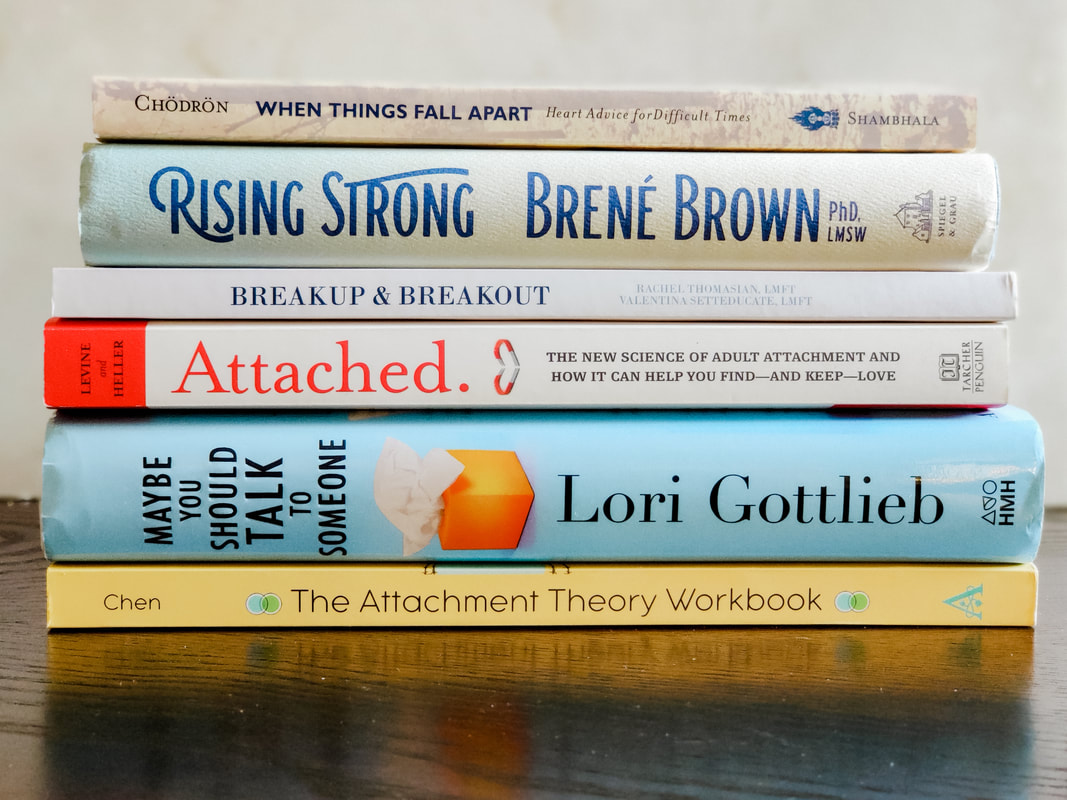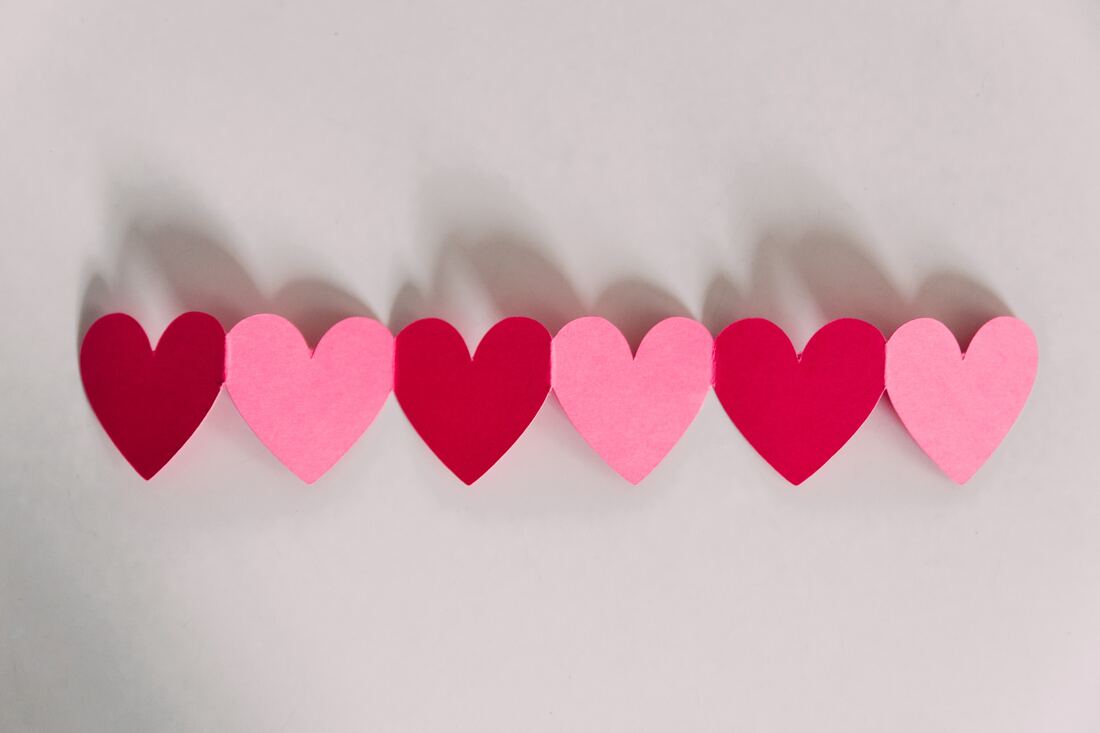|
It is common that breakups can stir up a lot within us. The loss of a major relationship in our life can cause us to think about different aspects of ourselves, how we relate to others, how we cope and what we may or may not be missing in our life. Because breakups can cause this kind of reflection and introspection, it can be useful to have resources to help navigate these thoughts that may be coming up. Below are six book recommendations along with why we think that they could be especially beneficial after a breakup. 1. BreakUp and BreakOut by Rachel Thomasian and Valentina Setteducate We wanted to write a book that could really support anyone going through a breakup. Our book is meant to help provide education around why breakups are so hard, give exercises to help deepen understanding and help the reader engage in a way that helps them connect more to themselves and get to a place of healing, closure and connection that they create from within. 2. Attached by Amir Levine This book is a great education tool and talks extensively about attachment styles and the ways in which we relate to others (specifically romantic partners). This book can be helpful in understanding why certain matchups can be more difficult than others and can be a tool to deepen understanding of yourself and your needs (and how you express or do not express them) in relationships. If you are wrestling with certain patterns that seemed to keep occurring in your past relationship, this book may help gain some insight into why. 3. Rising Strong by Brené Brown If you have not heard of Brené Brown- you should look into her books and her work. She is a therapist and has extensively studied shame and vulnerability- two very important topics when it comes to relationships. In Rising Strong, she speaks about what it feels like to get up and be brave after we fall down, and helps the reader identify the stories we tell ourselves that keep us down. This book provides strength and hope to anyone going through a tough time and trying to stand back up and move forward. 4. Self-Compassion by Dr. Kristin Neff This book is an absolute must read for anyone- but can be especially helpful if you are being very hard on yourself due to a recent breakup. Dr. Neff talks about the three different components that make up self-compassion, and includes endless exercises to help practice showing ourselves grace and love. Breakups can often kick up guilt, shame and other tough feelings that can cause us to be hard on ourselves, and this book helps the reader work on and become aware of the ways in which we talk to and treat ourselves. 5. When Things Fall Apart by Pema Chödrön Pema Chödrön is a Buddhist nun who has written several best-selling books. In this book, When Things Fall Apart, she provides spiritual insight to help clients navigate tough feelings- especially the ones that come up when things do not go as planned in our lives. This book is divided up into short chapters that are all labeled so you can skip around and come back to certain ones that resonate with what you are specifically going through. When Things Fall Apart is a great book to have in your back pocket and something to quickly come back to if you need words of affirmation or some loving guidance. 6. Maybe You Should Talk to Someone by Lori Gottlieb Lori Gottlieb is a psychotherapist that writes about her work with clients as well as her relationship with her own therapist following a breakup. This book is a fascinating sneak peek into the healing that happens through therapy and the relationships that impact our lives. As you follow Lori in her sessions with clients working through relationship struggles, while she works through her own loss, you learn about the intricacies of interpersonal relationships as well as the significance of your relationship with yourself. We also appreciate that this book normalizes the experience of therapy by shining light on the process and revealing the warmth, care and fun that exists in the therapy room. When the pain is so fresh from a breakup, it is normal to be reaching for anything that can help us to feel better. However, we often tend to reach for something that causes us to feel more pain- whether that be stalking an ex on social media because we miss them, turning to unhealthy foods or substances to numb out, and/or completely isolating ourselves in order to cope with hard feelings. If you have done (or are) doing these things, this is common and it makes sense. We do what we feel we know how to do in order to cope with hard feelings that we are forced to confront after such a big loss in our lives. If you are coping in ways similar to the examples above, I want to provide you with three quick, helpful steps that can point you in the direction of starting to move forward after a breakup.
1.Delete social media for 60 days Social media can be extremely toxic after a relationship. It can be a place where we spend large quantities of time on trying to see what our ex is doing, who they are hanging out with and trying to get any clue into how they might be feeling. Almost always we do not find what we are hoping to find. People often do not show their authentic self on social media- so we do not get to truly see their inner thoughts, their day-to-day or how they are coping with certain emotions. Spending time on social media can bring up more negative thoughts and actually contributes to spending more time consumed by your ex and the past instead of focusing inward in order to feel better. A sixty-day hiatus from all social media platforms has been shown to be effective in allowing more time to reflect and do things for you, instead of spending energy focused outward and consumed by negative thoughts and feelings about your breakup. 2.Commit to a new self-care habit for one month Studies show that implementing a new habit takes some time to do. Whenever we are trying to heal or move forward from any hard feelings, it is so important to get in touch with certain activities that make us feel better. This could be things such as a workout, tea at night before bed, walking outside more often, creating a playlist you like and listening when you are sad, etc. Big or small, it is important to start to understand what kinds of things help us to feel more grounded and then begin to do them more regularly. Pick one thing that does this for you and commit to doing it for a month. Not only will it allow you to be intentional about moving forward, but if you can do it consistently for a month it may become a habit that you continue even once you start to feel better. If we want to feel better, we need to change the things that we do daily in order to start that process. 3.Call a therapist There is a reason that therapy is becoming more normalized and less stigmatized in the recent years. It can be really difficult and feel scary to take that first step and find a therapist if you have never done it before, but it can be a powerful and profound space that is just for you. It is a place where you can talk about whatever feels present with someone who has the education, knowledge and experience to guide you through tough feelings and help you navigate the heaviness of a breakup. We cannot do things alone and it is okay to reach out for help when we are struggling. Finding a therapist that is a good fit can be a great step towards feeling both supported and connected during a tough time in life. With all that is going on in our world, it is normal if you are feeling fear, worry, sadness and uncertainty. There are so many unknowns, and managing this for any human being can be tough during a time of such uncertainty. While this is all going on, our lives are also still moving forward. If you have recently experienced a breakup, you may be experiencing all of the emotions related to that, on top of all of the emotions related to COVID-19 and the state of our world. Below are some ways to still address your feelings around your breakup, while working towards more healing and peace around your lost relationship. 1. Journaling as a way to process While you may have more time to think and be in private, this can be a great opportunity to utilize writing. Journaling by nature is a way to reflect and work through certain thoughts and feelings that may be coming up. There may be a lot that is present for you around your breakup, and you may feel that with social isolation, you have limited access to your usual coping skills (such as the gym, seeing friends, etc.). Taking the time to write down your thoughts can be a helpful way to understand what is coming up for you, acknowledging your feelings by writing them down, and thinking about what you need in order to take care of yourself and feel better. You may even have more privacy to access this coping skill when needed! 2. Connect with trusted friends and family over FaceTime You may not be able to see friends and family in the way you are used to right now, but connection is still of upmost importance when going through a breakup. Even though it may not feel the same, planning time to connect over video or phone with trusted loved ones is a must. Take time to look at your calendar and see where you can fit in certain call times and make a date! This can also be an opportunity to connect with friends who may live far away from you, whom you normally don’t get to speak with as much. Instead of seeing this is a time of disconnection, can it instead be looked at as a time to reconnect with friends who you haven’t been able to catch up with for a bit? 3. Movement as part of healing Spending more time in social isolation due to COVID can make it easy to stay stationery. Although you may be limited to the ways in which you are used to moving and working out, movement is crucial for getting out of your head and into your body. If it is cold and you can’t go outside, can you set a timer for 20 minutes and stretch your muscles? Can you download a mediation online or on your phone and do some breath-work? Can you FaceTime a friend and do a workout together? This can be a fun time to think outside the box and get creative around movement and how to stay physically healthy. You may even find some practices that you want to integrate moving forward as a part of your daily schedule. 4. Taking time to engage with hobbies and interests Oftentimes during a relationship, it is easy to focus on the other person and not ourselves! Now that you are not in that relationship, and have more time around the house, this can be your chance to get intentional on what you can engage with (or re-engage with!). It is important that while experiencing hard feelings, we are able to stay present with activities that we enjoy and feel connected to. This may be cooking, drawing, playing an instrument, finishing a puzzle, or even doing that spring cleaning you have been wanting to get around to. There are many resources online that offer step by step videos to help you get started if you want to try a new hobby! The opportunities are endless. After a breakup, it can be common to ask yourself the question “can I be friends with my ex?” Oftentimes, we may not know how to comprehend not having someone in our life who once played such a large and crucial part in it. If you are out of a breakup and thinking about wanting to have a friendship with your ex, here are some things to consider.
1. Am I worried about losing this person? Is the motivation to be friends with your ex coming out of a fear of losing this person altogether? Acting from a place of fear is never helpful, and often will leave us anxious and not aligned with our true self and needs. If being friends with this person is motivated by not wanting to say goodbye, it may be important to do some reflecting on what this fear is and how it can be healed outside of having a friendship with your ex. 2. Are my romantic feelings gone? Once we are romantically involved with someone, it can be very confusing to detach from that part of the relationship and have a friendship not based around a romantic nature. It is important to understand that when we date someone and have a sexual relationship with them, our brain actually is wired differently and can become deeply attached to this person. Moving from being someone’s romantic partner to their friend is not always black and white, and it can be important to ask yourself if you are still having romantic feelings towards this person. Do you still feel attached to them? Do you still want a physical connection with them? If the answer is yes, it can make it harder to move to a friendship. 3. How will I feel if this person starts dating someone else? Friends are people we can go to for advice and support in our life, and we often turn to friends when it comes to dating advice. If you are thinking about being friends with your ex, think about what it may feel like if that person were to start dating again. Would you feel okay with giving them advice or listening to them talk about having feelings for someone else? If we are wanting to be friends with our ex, that means being able to show up for them as you would any other close friend, so considering what you may feel if they begin to like someone else can be important to think about. 4. Would this friendship need boundaries? Given that you have a history of romantic relations with your ex, this would be a friendship that may need to have different boundaries than other friendships in your life. Thinking about what those boundaries would be, how you would enforce them, and how they might feel for you all are things to think about, and be able to dialogue about with your ex should you two choose to continue a friendship together. There is no black and white answer to the question of whether it is possible to be friends with an ex. Some people are able to do this, and for others it can be much more difficult, or not possible at all. Asking yourself the above questions and intentionally giving this relationship thought and effort is an important step in the process should you choose to try and purse a continued relationship after the end of a romantic one. Any holiday after a loss can be difficult, but living through the holiday meant for celebrating romance when you’ve just experienced a breakup can feel torturous. The good news is, it doesn’t have to be and you will survive it, and with the help of our tips, we’re hoping you can even enjoy it!
1. Nurture your relationship with yourself. No matter what falls apart in your life, you can always come back to yourself and grow from there. When you engage in the kind of self care that nourishes your soul, you’re improving your mental health, your wellbeing, and every single relationship you have and will have in the future. 2. Don’t neglect the other relationships in your life. Valentine’s Day doesn’t have to be reserved only for romantic relationships. Take some time to connect with your friends, siblings, children, parents and coworkers. Celebrate all relationships. 3. Plan your day in advance. To set yourself up for success on this Valentine’s Day, we recommend you do some planning instead of winging it and hoping it goes well. Whether you plan a Galentine’s dinner with your friends or get take out and watch a movie solo, plan the details in advance to avoid the disappointment of your friends already having plans or your favorite restaurant not doing deliveries that night. 4. Honor your feelings, but don’t get stuck in them. It’s natural to feel some sadness and loss on this day, when everyone else seems to be celebrating their relationship. Know that it’s normal, acknowledge your emotions and don’t try to ignore them completely. You can, however, also choose to engage in activities that will distract or take you away from the difficult emotions even if it’s for small chunks of your day. 5. Schedule some feel good moments. Plan for some activities that will help take you away from any negative feelings you might have. Wake up with a meditation, ask a colleague to go out for coffee, go for a walk during your break. When we think of Valentine’s Day, we think of romance, flowers, chocolates and fancy dinner reservations. For most people, the last thing they associate the holiday with is breakups. However, more breakups happen the Tuesday before Valentine’s Day, now dubbed Red Tuesday, than any other day of the year, and the weeks following Valentine’s day see the highest rates of breakups than any other time of year.
Breakups are never fun but when you see why this is the case, you may agree with us that this phenomenon isn’t as tragic as it sounds. Before you start thinking that Valentine’s Day itself is a curse on relationships, let’s examine the reasons why these breakups happen. 1. Most breakups happen before or after a significant holiday or anniversary. For people who are thinking about ending their relationship, it’s simply a calendar marker for when it might happen. The question becomes, do you try to enjoy the holiday with your partner one last time or spare having to purchase a gift and make plans? These significant dates make think about if they want to spend another holiday in this relationship if they are truly unhappy. 2. Especially in the era of social media, our relationship is scrutinized in comparison to other relationships. It’s easy to start believing other people are happier and more in love, are more admired by their partners or simply in relationship that’s better than yours. Although it’s not fair to judge your relationship based on the size of (or lack of) floral arrangements you receive on February 14th, if you’ve been feeling neglected and unhappy for a while, you may start thinking about if your relationship holds enough for you. 3. The day is primed for testing if your partner measures up. Whether it’s your favorite holiday or say you don’t care for it at all, it’s an opportunity to notice how significant your relationship is to your partner and how much effort they put into it. It’s not about how much is spent, but rather the attention and effort you get. 4. Under pressure, you may start analyzing all the things that are not working in your relationship. There’s so much artificial and unnecessary pressure for Valentine’s Day to feel perfectly romantic, there are few who are left truly satisfied on this evening as it is. Additionally, if you’re already unhappy with the dynamic in your relationship, the pressure could cause it to boil over. You’ll notice in all of these situations that a breakup was probably impending and possibly inevitable. Breakups aren’t necessarily a bad thing, more often than not it means the end of a relationship that wasn’t working in one or more essential ways. There it’s anything about Valentine’s Day that causes breakups, instead it influences people to examine their relationships and their level of satisfaction within it. For relationships that aren’t working for one or more partners, the unique properties of Valentine’s Day makes them notice and respond to those cracks in a way they may have been avoiding. Whenever a relationship ends, no matter what side of it you are in, it is common that there are questions left unanswered, questions never asked, or questions that continue to linger even after conversations with you and your ex have ceased. As human beings, we like certainty and can feel anxious and upset when we aren’t sure what’s going to happen or what someone else is thinking- hence why we are always seeking closure when any relationship has ended. Although it is perfectly normal to want answers, there are certain questions that often leave us feeling more upset, lead us to criticize ourselves, and keep us stuck in unhelpful thinking styles. Below are some questions to avoid asking yourself following your breakup:
1. ‘What could I have done differently?’ It is not uncommon to look back on a relationship and think of all the ways that you could have showed up differently. Although it’s true that it can be helpful to reflect on your words and actions in a past relationship, if you are feeling stuck in wondering what could be different and wanting to do it over, these thoughts can become very unhelpful and lead you to feeling like the end of the relationship was 100% your responsibility. This question can keep you stuck in the past and hinder you from thinking about what you are looking for and seeking in your next relationship. Often it is the case that even if we had done or said some things differently, things would have still ended up the same in the end. Focusing on the past hinders the process of being present and moving forward. Stay focused on how you want to show up for yourself and someone else both now and in the future. ‘2. What is going on in my exes head?’ or ‘What are they thinking about me?’ We don’t know what is going on in someone else’s head. Unless we ask directly and trust their answer, everything else is an assumption. Social media allows us to feel like we know what they are doing, how they are feeling and what they are thinking- but we do not know for sure! This question keeps us in a circle of assuming and filling in the blanks- and when we are hurting, we often do not fill in the blanks in a positive way. When this question or thought comes up, try reminding yourself that it is normal to wonder what they are thinking, but that there is no way for us to know for sure. Stay focused on your own thoughts and feelings because that it what you have control over. 3. ‘What’s wrong with me?’ This question can be so common if you are the person who was broken up with. The truth is that nothing is wrong with you. A relationship not working does not mean anything about who you are as a person, and this internalization can be a slippery slope that leads to wounded self-esteem and feelings of sadness. It is okay to feel upset and to let those feelings in after a breakup, but be careful of the trap of internalizing the end of a relationship to mean something about you. Instead of ‘what’s wrong with me’, thoughts such as ‘The end of this relationship is bringing up a lot of sadness and defeat’ is more helpful and allows you to acknowledge whatever feelings are coming up for you. Part of the reason that we may look forward to the holiday season is because it is a time that symbolizes love, family, connection, relaxation, community. All of these aspects of the holiday can be what make it so enjoyable, but can also feel even more devastating in the wake of heartbreak. With hallmark movies all over TV, photos of friends and family gathering together with smiles, and talk of vacation, engagements and time with loved ones- it may feel overwhelming and even tougher to be dealing with hard feelings.
Below are a few things to keep in mind if you are working through the loss of a relationship during this holiday season. 1. Connect, connect, connect! During a time where it feels everyone else may be doing great, feeling good, and loving on one another, it may feel tempting to isolate and crawl into yourself. Although the appeal makes sense, it is in these moments when it is even more important to reach out for connection around you. Let yourself be loved on and let yourself be taken care of. If during the holidays you are with friends and family, let them know that you are needing more connection, and be open to the ways they may show you this love and support. During a season of heartbreak is when we most often need to feel the support and connection from those still in our lives, even though it may feel tougher to ask for. 2. Set boundaries You may not be feeling like yourself this holiday season if you are grieving the loss of a relationship. It is okay to not be running on a full tank. If this is the case for you, it is important to give yourself permission to leave a setting where you feel overwhelmed, to not have that drink if you feel it will make you more upset, and to let others know that you may be feeling less up to some of the things that you usually might enjoy. Instead of a night out at the bar with friends, it may be that staying in with a friend or a family member and watching a movie feels better. Reflect on what feels best and practice communicating those needs and boundaries to those around you. 3. Be compassionate with yourself Struggling with loss during the holidays is hard. The holidays seem like they ‘should’ be a happy, upbeat, enjoyable time, and that may not feel like the case this year for you. Being able to show yourself some kindness and feel the tough feelings is important. If you cry at a holiday party, breakdown at dinner with your family, or are not engaging how you usually do- practice compassion! Breakups come with lots of feelings, and we are human beings who are feeling them at different moments. If something happens that is upsetting to you, be aware of how you may be talking to yourself, and if you are needing some love and comfort, it can be an important time to give that gift to yourself. Self-compassion is a powerful practice, and the holiday season is a good time to start this practice. 4. Take breaks from negative thinking Being able to acknowledge your feelings is important in any healing process. With that being said, be conscious and allow yourself to take breaks when you are feeling overwhelmed or consumed by tough feelings. If you are noticing lots of defeated and negative thinking going on, call awareness to it and engage in an activity, call a friend, or do something that engages your body in order to help you get out of your mind for a bit. The tough thoughts and feelings will come. Acknowledge them, feel them, but also continue to move on with things that bring you joy and with people whom you feel connected to. |








 RSS Feed
RSS Feed